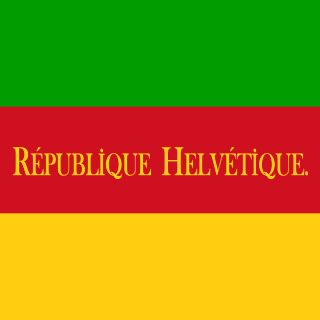
The Helvetic Republic was a sister republic of France that existed between 1798 and 1803, during the French Revolutionary Wars. It was created following the French invasion and the consequent dissolution of the Old Swiss Confederacy, marking the end of the ancien régime in Switzerland. Throughout its existence, the republic incorporated most of the territory of modern Switzerland, excluding the cantons of Geneva and Neuchâtel and the old Prince-Bishopric of Basel.

The Canton of Baden was a canton of the Helvetic Republic. Its capital was the town of Baden.

During the French Revolutionary Wars, the revolutionary armies marched eastward, enveloping Switzerland in their battles against Austria. In 1798, Switzerland was completely overrun by the French and was renamed the Helvetic Republic. The Helvetic Republic encountered severe economic and political problems. In 1798 the country became a battlefield of the Revolutionary Wars, culminating in the Battles of Zürich in 1799.

This is a list of referendums related to the European Union, or referendums related to the European Communities, which were predecessors of the European Union. Since 1972, a total of 48 referendums have been held by EU member states, candidate states, and their territories, with several additional referendums held in countries outside the EU. The referendums have been held most commonly on the subject of whether to become a member of European Union as part of the accession process, although the EU does not require any candidate country to hold a referendum to approve membership or as part of treaty ratification. Other EU-related referendums have been held on the adoption of the euro and on participation in other EU-related policies.
There have been several referendums in the history of Poland.

The Federal Constitution of the Swiss Confederation of 18 April 1999 is the third and current federal constitution of Switzerland. It establishes the Swiss Confederation as a federal republic of 26 cantons (states). The document contains a catalogue of individual and popular rights, delineates the responsibilities of the cantons and the Confederation and establishes the federal authorities of government.

The Act of Mediation was issued by Napoleon Bonaparte, First Consul of the French Republic on 19 February 1803 establishing the Swiss Confederation. The act also abolished the previous Helvetic Republic, which had existed since the invasion of Switzerland by French troops in 1798. After the withdrawal of French troops in July 1802, the Republic collapsed. The Act of Mediation was Napoleon's attempt at a compromise between the Ancien Régime and a republic. This intermediary stage of Swiss history lasted until the Restoration of 1815. The Act also destroyed the statehood of Tarasp and gave it to Graubunden.

Waldstätten was a canton of the Helvetic Republic from 1798 to 1803, combining the territories of the founding cantons of the Old Swiss Confederacy, Uri, Schwyz and both cantons of Unterwalden, which were collectively known as Waldstätten since the 14th century, along with Zug, the Republic of Gersau, and Engelberg Abbey.

A referendum on a new constitution was held in South Africa on 2 November 1983 in which the white population was given the opportunity to approve or reject the Constitution of 1983. This constitution introduced the Tricameral Parliament, in which coloured and Indian South Africans would be represented in separate parliamentary chambers, while black Africans, who were the majority of South Africa's population, would remain unrepresented. The referendum passed with 66.3% of voters voting "Yes"; consequently the new constitution came into force on 3 September 1984.

The Rhodanic Republic, officially the Republic of Valais or Vallais, was a sister republic of France that existed between 1802 and 1810 in the French-speaking part of Switzerland, during the Napoleonic Wars, in the territory corresponding with the modern Swiss canton of Valais.

A referendum ratifying the new constitution of the Consulate, which made Napoleon Bonaparte First Consul for life, was held on 10 May 1802. The official result showed 99.76% of voters in favour of the change. Of seven million eligible voters, 49.45% abstained.

Fricktal was a canton of the Helvetic Republic from February 1802 to February 1803, consisting of that part of the Breisgau south of the Rhine. Now, the territories of Fricktal form the districts of Rheinfelden and Laufenburg in the canton of Aargau.
Five referendums were held in Switzerland during 2005. The first two were held on 5 June on Switzerland joining the Schengen Area and whether registered partnerships for same-sex couples should be introduced. Both questions were approved. The third was held on 25 September on a federal resolution on extending the agreement on free movement of people to new members of the European Union, and was also approved. The final two were held on 27 November on a popular initiative "for food from an agriculture free of genetic modification" and on a labour law related to the opening times of shops in public transport hubs. Both were approved.

Bourla-Papey was the name given to a popular revolt that took place between February and May 1802 in the Canton of Léman, in Switzerland, during the days of the Helvetic Republic. The uprising was in response to the restoration of feudal rights and taxes that had been abolished following the French invasion of 1798. The Bourla-papey seized archives from castles in the area now known as the Canton de Vaud, which they burned in an attempt to destroy records of what was owned by whom, making it impossible to collect taxes.
Six referendums were held in Switzerland during 2010; three in March on pension funds, animal protection and a constitutional amendment, one in September on unemployment benefits, and two in November on deporting foreign criminals and introducing a canton tax.

The territorial evolution of Switzerland occurred primarily with the acquisition of territory by the historical cantons of the Old Swiss Confederacy and its close associates. This gradual expansion took place in two phases, the growth from the medieval Founding Cantons to the "Eight Cantons" during 1332–1353, and the expansion to the "Thirteen Cantons" of the Reformation period during 1481–1513.

A constitutional referendum was held in Poland on 25 May 1997. Voters were asked whether they approved of a new constitution. It was narrowly approved, with 53.5% voting in favour. Voter turnout was just 42.9%. Although the 1995 Referendum Act stated that a 50% turnout was required to validate the referendum, the Supreme Court ruled on 15 July that the constitution could be introduced.
Three referendums were held in Switzerland during 1947. The first was held on 18 May on a popular initiative for "economic reform and rights concerning work", and was rejected by voters. The second and third were both held on 6 July on revising the articles of the federal constitution covering the economy and a federal law on aged and bereavement insurance. Both were approved by voters.
A constitutional referendum was held in the Helvetic Republic over several months in 1798. Modelled after the French Constitution of the Year III of 1795, the new constitution was approved by voters. In some places voting took places in public assemblies, whilst in others the local councils took the decision.
A referendum is a direct vote in which an entire electorate is asked to either accept or reject a particular proposal. This article summarises referendum laws and practice in various countries.













